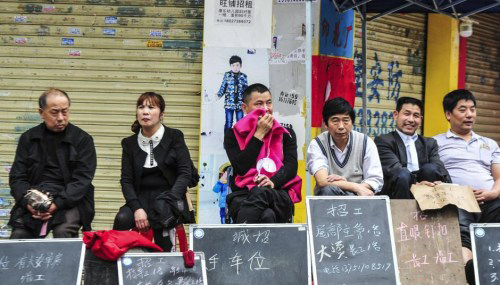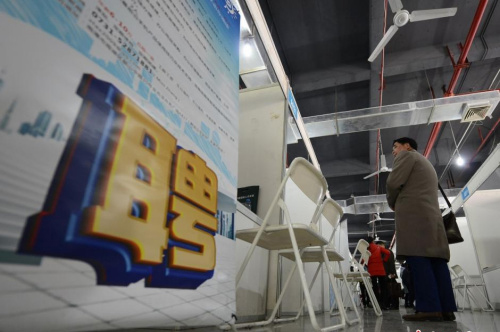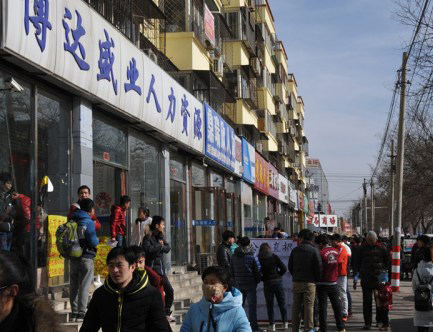
"In 2008, the minimum wage for workers was only 1,800 yuan. At that time, it was easy to recruit people. Now, the wages of workers are up to 4,000 yuan, and the accommodation facilities are basically perfect. Even so, I am very It is difficult to recruit people." This is the most intuitive feeling of "the difficulty of recruiting workers" Lu Qiaoling, the owner of a handicraft company in Quanzhou, Fujian.
Lv Qiaoling's troubles, many local private enterprise bosses feel the same. Like Lu Qiaoling, who is engaged in manufacturing, Wang Canming, who opened a wedding company in Quanzhou, is also facing the problem of “difficulties in recruiting workersâ€.
Wang Canming said, "Today, the monthly salary is 3,000 yuan, it is difficult to recruit people, but for enterprises, this is no small pressure."
The troubles of Lu Qiaoling and Wang Canming are a microcosm of the difficulty of recruiting many private enterprises in Quanzhou. After the Spring Festival every year, news about Quanzhou enterprises “difficulties in recruiting workers†will frequently be seen in local media.
Quanzhou, as one of the more representative regions of the country's private economy development, has made great achievements in economic development since the reform and development, and private enterprises have played an important role in the local economic development. Last year, the city's total production value reached 614.9 billion yuan, the added value of industrial enterprises above designated size was 290.3 billion yuan, the general public budget total income was 80.5 billion yuan, and the fixed assets investment of the whole society was 348.3 billion yuan, ranking 23th in the country and 17 consecutive years. Ranked first in Fujian Province.
When Lv Qiaoling, the owner of the private enterprise for 18 years, had indeed tasted the sweetness of the development of Quanzhou, she once ushered in the golden period of career development, and the scale of her employment had reached more than 400. However, in recent years, her business has been declining, and today her company employs less than 60 people.
"'Difficulties in recruiting workers' restricts the development of our enterprises, which leads to the increase in labor costs, and also forces us to reduce the scale of these small and medium-sized enterprises." Lv Qiaoling said, "Compared with 2008, the current labor costs have risen nearly one. Double, but corporate profits have risen by less than 5%."
In Lv Qiaoling's view, at present, workers are the "bosses". They can say that they can leave at any time and immediately switch to other companies.
"'It's difficult to recruit workers' makes the boss even more difficult. I don't dare to fire employees casually. The company's system has sometimes become a slogan." Lu Qiaoling said helplessly.
The problem of “difficult recruitment†exists not only in Quanzhou, but also in many parts of the country. After the festival, many places have also exposed the company's “difficulty in recruiting workersâ€. For example, “Some of the two recruitment fairs in Fuyang encountered “difficulties in recruiting workersâ€â€, “Chengdu in Chengdu faces difficulties in recruiting workers: cleaning staff is higher than company supervisorsâ€, “Shanghai After the last festival, the recruitment was cold, and the phenomenon of “work shortage, difficulty in recruiting workers†was serious.
As a province with a large labor importation, the problem of “difficulties in recruiting workers†has been seen in the media almost every year, which has sparked heated discussion in the society.
Take Guangzhou as an example. Recently, some media reported that according to the survey data of 424 local enterprises conducted by the Guangzhou Human Resources Market Center, the number of workers missing after the Guangzhou Festival this year will reach 189,100. At the first comprehensive job fair held by the center, more than 70 companies entered the market and provided more than 2,000 jobs. However, there were very few migrant workers on the job.

“The number of migrant workers is decreasing.†This is a common phenomenon in many eastern coastal cities.
The "2015 Province Human Resources Supply and Demand Analysis Report" released by Zhejiang in early February showed that the proportion of migrant workers who came to work in Zhejiang last year fell. According to the data of human resources market in Zhejiang Province, the proportion of Chinese and foreign personnel in job seekers in 2015 was 48.11%, down 2.51 percentage points from the same period of the previous year.
The report also pointed out that in 2015, Zhejiang Province's human resources market demand for the average number of posts was 1,135,300, and the number of job seekers was 754,600. From the comparison of supply and demand, the average demand gap was 380,700, a decrease of 147,100 over the previous year. The number of market positions is still greater than the number of job seekers.
The reduction of migrant workers has undoubtedly aggravated the problem of “difficult recruitment†for many enterprises. Nowadays, with the export of many labor services, especially in the western provinces of China, some migrant workers are no longer willing to choose to work in a foreign land. Therefore, local development has become their new choice.
Zhang Lu, a girl from Sichuan Neijiang who just entered the society after 90 years, plans to go home after the Spring Festival this year. Last year, like many relatives and friends, she chose to leave her hometown to work in the field. This year, after seeing the development of her hometown, she chose to go home to work.
Zhang Lu’s hometown, Neijiang, is a large exporter of labor services. Every year, thousands of people go out to work. Last February, Sichuan Daily reported that Neijiang had a total population of 4.3 million, while migrant workers had 1.18 million, more than a quarter.
Zhang Lu said, "In recent years, Neijiang has developed faster and faster, more and more companies, and our work opportunities have been increasing. Many of our friends are also considering going home to develop."
Similarly, recently, Cui Erwei, a young man from Nanzhao County, Henan Province, who has been working for many years, made the same decision. This year, he chose to stay in his hometown and open an online shop.
“The wages of migrant workers are not highâ€, “the pressure of going out to workâ€, and “the potential for economic development of the hometown†is the reason why Cui Erwei decided to “leaveâ€.
Cui Erwei said, "I mainly want to open a specialty store on the Internet, specializing in the local products on the Fu Niu Mountain, including honey, silkworm cocoons, bracken, mushrooms, fungus, pecans, etc."

In some of the major labor exporting provinces, some young people choose to stay in the local development, but there are still many people who choose to go out to work. At present, with the emergence of the problem of “difficult recruitmentâ€, these migrant workers who choose to go out to work have become “fragrantâ€.
Nowadays, many migrant workers are no longer willing to choose a job. The criteria for finding a job include: monthly salary, welfare benefits, environment, labor intensity, etc., and have experienced the “job workâ€. Nowadays, many migrant workers are also looking for employment. As the work began, “ride the horse to find the horseâ€, enter the “jumping season†and start “pick the jobâ€.
Recently, when reporters visited the commercial street of Maqiaoqiao, Tongzhou District, Beijing, they found that such a small commercial street has dozens of labor companies, and in front of these labor companies, a group of people can always see a queue of consulting work.
"Close to Beijing Economic Development Zone", "a large number of migrants, and ample labor" is the two major advantages of Mazhaoqiao's economic development. According to relevant data, the total number of households in Mazhaoqiao Town is 20,129, with a total of 44,893, while the number of registered floating population is 82,600.
Xi'an young man Xiao Yang, who has been drifting for more than two years in the north, is one of the "82,600 people." After the Spring Festival, he immediately rushed back to Beijing, hoping that the company needs a large amount of recruitment and picks up the work. In Xiao Yang's view, the monthly salary can reach 4,000 yuan, the work is easy, and the company can eat and wrap, which makes him very satisfied.
"At the moment, I am still watching. If there is a suitable job, I will not stay in the original car repair shop." Xiao Yang said, "In the past few days, I will go to various labor companies every day to see if there is any satisfaction. For the job, fill out a form and then follow the staff to the employer for an interview."
At Ma Rongqiao, there are not a few migrant workers like Xiao Yang. The staff of the local labor service company told reporters that it is more and more difficult to recruit, and there seem to be many people who come to consult, but many people are picking up jobs. “Every time there are a bunch of people going to the business interview, but in the end, there are not many people who choose to stay and work. Many people are waiting to see a job with higher salary and more satisfaction.†(At the request of the respondent, Some characters in the text are pseudonyms)
Valves are found in virtually every industrial process, including water and sewage processing, mining, power generation, processing of oil, gas and petroleum, food manufacturing, chemical and plastic manufacturing and many other fields.
People in developed nations use valves in their daily lives, including plumbing valves, such as taps for tap water, gas control valves on cookers, small valves fitted to washing machines and dishwashers, safety devices fitted to hot water systems, and poppet valves in car engines.
In nature there are valves, for example one-way valves in veins controlling the blood circulation, and heart valves controlling the flow of blood in the chambers of the heart and maintaining the correct pumping action.
Valves may be operated manually, either by a handle, lever, pedal or wheel. Valves may also be automatic, driven by changes in pressure, temperature, or flow. These changes may act upon a diaphragm or a piston which in turn activates the valve, examples of this type of valve found commonly are safety valves fitted to hot water systems or boilers.
More complex control systems using valves requiring automatic control based on an external input (i.e., regulating flow through a pipe to a changing set point) require an actuator. An actuator will stroke the valve depending on its input and set-up, allowing the valve to be positioned accurately, and allowing control over a variety of requirements.
Stop Valves, Ball Cock, Angle Valves, Gate Valves, Check Valves
ZHEJIANG KINGSIR VALVE CO., LTD. , https://www.kingsir-valves.com